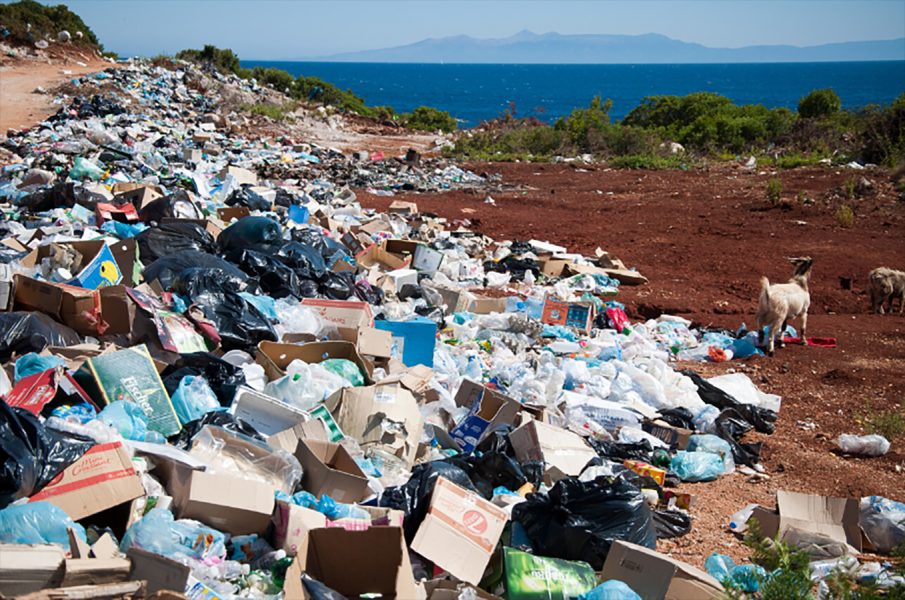Plastic is without a doubt the poster child for the war-on-waste, and with good reason. Plastic production is one of the fastest-growing contributors to greenhouse (GHG) gases. Plastics are derived from a process called polymerisation, which is essentially a series of chemical reactions on organic raw materials, mainly natural gas and crude oil. Different types of polymerisation create different plastics, seven in total, some of which cannot be recycled. Collectively, we have accumulated 9.2 billion tonnes of plastic worldwide since 1950. In the UK, three-quarters of all plastic consumed goes directly to landfill.
Unlike metal or glass, plastic can only be recycled a finite number of times. Recycling degrades the quality of plastic.
“Therefore, all plastics will inevitably go to landfill due to their limited lifecycle.”
That’s why the best option is to avoid it. All the plastics we have produced still exist and take over a thousand years to decompose. In this time, they will breakdown into microplastics and end up in all corners of the planet. Microplastics have been found in tap water, bottled water and on agricultural land in Europe. A 2019 study in Australia found that on average, each person consumes 5 grams of plastic every week, that’s the same as your bank card. These are alarming realities which we must face up to.
Now that we understand the enemy, is there any way to eliminate plastics from our life?
Given all the damaging effects, I wanted to see if I could limit the volume of plastic in my life. Doing some initial research, I was surprised to find such as an array of plastic alternatives, but most of them involved purchasing something ‘new’.
I began to wonder if this was just fuelling production, consumption and ultimately more pollution. Shopping won’t solve the climate disaster, therefore I needed to think about making some effective decisions which would reduce my own personal plastic plague from spreading. This research also taught me that food packaging has contributed the most to plastics found in the ocean. It’s very difficult to avoid plastic in the supermarket as it’s wrapped around so many products. In fact, the food packaging industry is valued at 278 billion dollars. Of course this industry doesn’t want to be stopped! It also doesn’t have to pay for the cost of environmental damages. We, as consumers, have to throw away any packaging we buy. So, not only do we pay for the item, we essentially pay for its disposal too. Optimistically, Which conducted a study that found that between 71% and 81% of supermarket food packaging (by weight) is widely recyclable. Nonetheless, recycling plastic won’t end plastic pollution, it just simply prolongs the life of existing plastic.
Making the most of what you have…
My home, like most, is full of plastic already, so I am going to focus on not using any more, just simply saying no and searching for alternatives. It’s also important to make any plastic items I have last. There are a few alternatives which will reduce my impact significantly and save me money. For example, switching to a bar of dish soap in the kitchen, shampoo bars and bamboo toothbrushes in the bathroom are only but a few ‘swaps’. Using a safety razor prevents an endless number of plastic razor heads being produced and going to landfill. Most razors are made from plastic and metal, making them non-recyclable. Safety razors use a single razor blade which can be disposed of at your local pharmacy, along with other sharp metal items. These items will displace a significant amount of plastic and are just a starting point in my bid to remove plastic from my life.
Plastic consumption hasn’t slowed down since its invention, having doubled over the past 20 years it continues to serve our convenience lifestyle. Single-use items have become symbolic of existence in the capitalist economy. We have a voracious appetite for convenience which feeds plastic production. As we head into the next decade, our world is predicted to produce 600 million tonnes of plastic per year. Our waste management systems and recycling process will not fix this expanding problem. A law was approved in EU parliament in March 2019 which will ban a wide range of single-use plastic items by 2021. Although this is promising, we as individuals need to take further action. Our own impact may not seem significant but if enough of us make small changes, the industry will also have to adapt.


